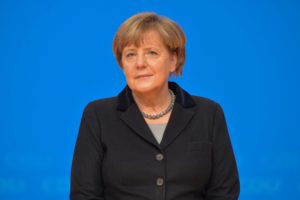Populism, Europe’s excessive debt, Trump, climate change, international terror – Angela Merkel faces great challenges at home and abroad…

(C) Public Domain Olaf Kosinsky
Angela Merkel has the chance to become Germany’s longest-serving chancellor. The Christian Democrat received the people’s mandate to form her fourth cabinet. That puts her in position to equal Helmut Kohl’s sixteen-year tenure.
Angela Merkel and her Christian conservatives have suffered heavy losses at the ballot box. As has the SPD, which will now go into opposition. The winners, as in the U.S., are the right wing populists. Now, for Merkel to govern another four years, she will have to forge a coalition with the free-market FDP and the Greens.
Merkel faces daunting challenges at home and abroad. Germany’s economy – the economic locomotive of the European Union – is booming. But many of Europe’s other economies are being kept under steam using borrowed fuel. The European Central Bank is lending money interest-free. In addition, the ECB is purchasing state and corporate bonds to the tune of $70 billion every month. The total volume of these asset purchases has reached $2.4 trillion.
This era of free money will inevitably come to an end. Less robust national economies, especially that of Italy, rely on the interest-free cash injections like junkies. Once free credit is gone and reasonable interest has to be paid once again, Italy’s economy will be thrown into crisis. France, too, will face instability. That, in turn, will weigh heavily on Germany’s export-oriented economy. And recessions generally lead to political turmoil – not only in Germany. The successes of populist movements in France, Italy, Hungary, Poland, and even the U.S. demonstrate as much. Germany is no island of the blissful. One voter in ten opted in favor of the far-right populist AfD. In parts of the east that figure was one in four.
Meanwhile, however, the populist, nationalist and/or putatively devout governments of some European countries and the U.S. have big issues with Germany’s democratic, liberal values. Turkey’s President Recep Tayyip Erdogan keeps trying to pressure Germany because Berlin needs Ankara’s cooperation to keep an EU-Turkish refugee deal operating. The governments of Hungary and Poland, meanwhile, refuse to take in the share of refugees assigned to them by the EU.
Russia refuses to hand the occupied Crimean peninsula back to Ukraine. Moscow supports pro-Russian separatists in eastern Ukraine militarily. The Kremlin also rejects the NATO memberships of the Baltic States. Indeed, Moscow continues to try to re-establish its political and economic hegemony over all these states, belonging as they once did to the Soviet Union. Neither Berlin nor NATO can accept Russia’s conduct without losing their credibility as reliable partners and the legitimacy of the transatlantic alliance. The result is a latent conflict between Berlin and Moscow.
Even more profound is Germany’s sudden but now ongoing verbal confrontation with the United States under the administration of Donald Trump. He claims to represent “America first.” Trump launched his presidency by declaring NATO obsolete and ridiculing the EU. These two institutions are pillars of German policy, as is free trade for the German economy. Trump’s mockery of civil rights and his tolerance of fascist and racist agitation directly violates the principles of Germany’s democracy. Here, Berlin had to react. Doing so publicly, however, by lecturing the U.S. president on democracy and human rights as Chancellor Merkel and her challenger Martin Schulz did, was no example of far-sighted diplomacy.
Donald Trump has three years left in his current term as president. Berlin will have to find a way to co-exist with Washington during the Trump era and, especially, thereafter. The United States is and will remain Germany’s strongest and most important ally.
Threats at home and abroad stemming from climate change and international terrorism will rise in an unstable world. To come to grips with these and other threats, Merkel will need a clear political concept, good luck and, first and foremost, the loyalty of the democratic German citizenry.■
